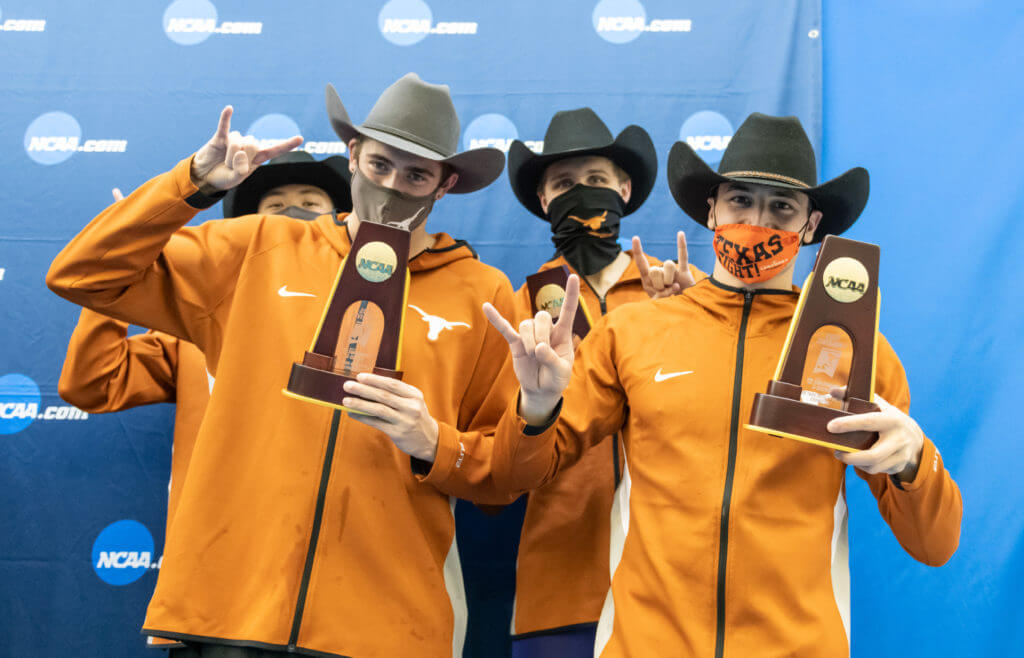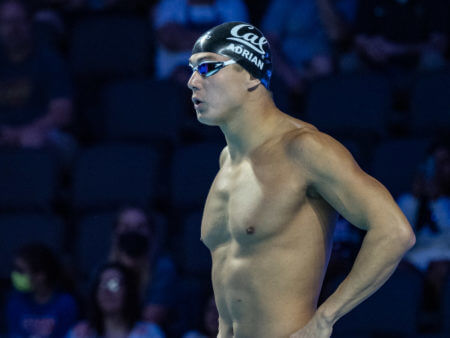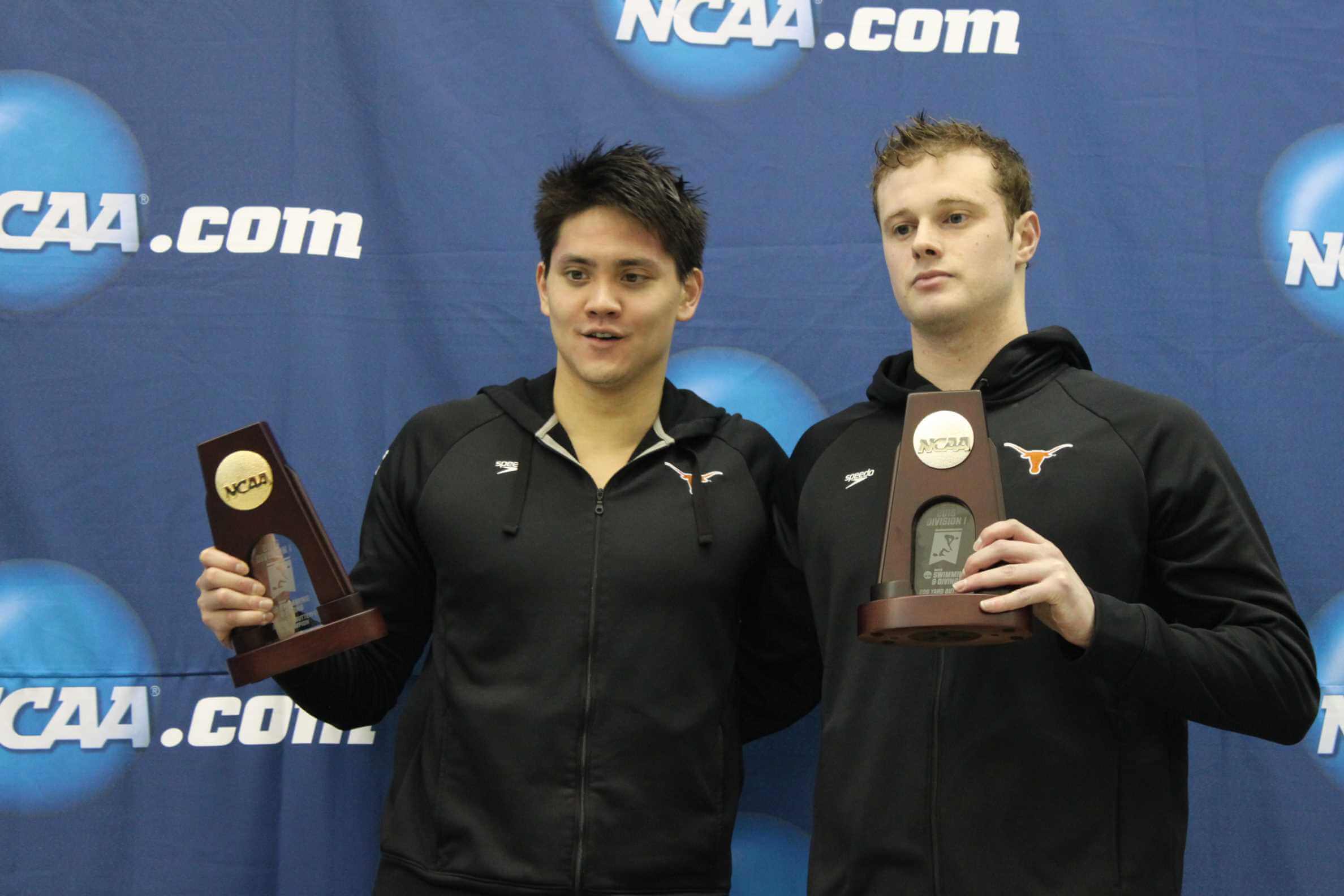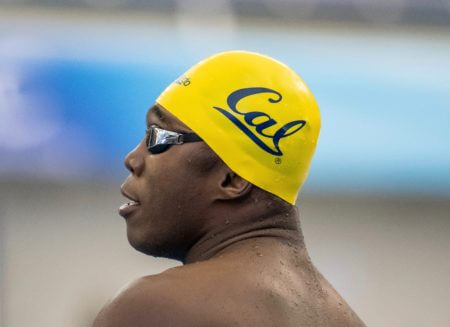11 Years Later, Texas and California Remain the Standard in Men’s College Swimming

11 Years Later, Texas and California Remain the Standard in Men’s College Swimming
It was the NCAA Championships almost derailed before the meet began. The University of Texas, the second-place team one year earlier, was favored to capture a national championship as U.S. Olympians Ricky Berens and Dave Walters concluded their stellar careers. But days before, the Texas men were one of three contending teams to deal with an outbreak of norovirus. The swimmers becoming so sick forced meet organizers into scramble mode, and eventually, the meet was delayed one day.

Nathan Adrian starred for Cal during his college career — Photo Courtesy: Peter H. Bick
In the end, Texas overcame their outbreak of illness and earned coach Eddie Reese his 10th national title and ending a seven-year title-less streak. But the Longhorns had to work especially hard in this one to overcome a surge by a California Golden Bears squad led by junior sprinter Nathan Adrian, a surprising freshman butterflyer named Tom Shields and third-year head coach Dave Durden. The assistant coach at the time was Greg Meehan, he of Stanford women’s fame a few years later.
Cal ended up finishing second at that meet, the highest finish for the Bears on the national level since 1986. One year later, Cal took down Texas to win its first national title since 1980, and the Bears repeated in 2012, with Texas again finishing as runnerup.
In 2013, the University of Michigan claimed the championship, followed by Cal in second and Texas third, but in the years since, no team besides Texas and Cal has finished in the top two at the national championship meet. Cal claimed wins in 2014 and 2019, and the Longhorns have won the other five meets in that span. The 2020 meet was cancelled due to the COVID-19 pandemic, but the Longhorns and Golden Bears were projected to top the standings at that meet, too.
A few of these meets have been blowouts in one direction or another, but some have come down to the wire — like Texas’ 2018 national title in Minneapolis. At that meet, Texas had seemingly wrapped up the win halfway through prelims on the final day with five A-finalists in two events compared to just one scorer for Cal, but the Bears then responded with five A-finalists of their own in the next two events while just one Texas man scored. And Indiana, with senior freestyler Blake Pieroni and junior breaststroker Ian Finnerty, was threatening to crash the party. But in the end, Texas prevailed by 11.5 points over Cal, with the Hoosiers just 15 further back.

Joseph Schooling (left) and Jack Conger recorded numerous 1-2 finishes at the NCAA Championships for Texas during their college careers — Photo Courtesy: Andy Ringgold / Aringo Photos
Consider the names that have swum on either side of this rivalry: for Texas, you have Jimmy Feigen, Jack Conger, Joseph Schooling, Will Licon and Clark Smith, among many others. Cal had the generation of Adrian, Shields and breaststroker Damir Dugonjic, and then later, Ryan Murphy, Josh Prenot, Jacob Pebley and Andrew Seliskar among their stars.
Of course, it takes deep rosters to win a championship, and we have seen many unsung heroes over the years. For Cal, swimmers like Justin Lynch, Pawel Sendyk and Michael Jensen have been key pieces to relay championships. Texas can’t forget backstrokers like Austin Katz and John Shebat, sprinters Tate Jackson and Brett Ringgold and the versatile Jon Roberts. Those lists certainly omit some obvious names, and that’s the point. The Longhorns and Golden Bears have been able to find production from so many different swimmers in their pursuit of NCAA titles.
Longhorns vs. Bears in 2022
Now, at the beginning of November 2021, Texas and Cal are again on a collision course for March, with the NCAA championships set for Atlanta. It looked like men’s college swimming would enter a new era in 2021-22 with Reese choosing to retire from coaching after he extended his own record with a 15th national championship last season, but he changed his mind in June and decided to return to chase his title No. 16.
Only one Texas swimmer qualified for the U.S. Olympic team, senior Drew Kibler, while sophomore Carson Foster barely missed on two separate occasions before later recording the world’s fastest time in the 400 IM. Cal has no U.S. Olympians on its current roster after Bryce Mefford chose not to swim a fifth year, but Trenton Julian returns. Julian just missed qualifying for Tokyo and a month later recorded the U.S.’s top 2021 time in the 200-meter butterfly. Redshirt senior Hugo Gonzalez was an Olympic finalist while representing Spain.
But both teams have an abundance of pieces accustomed to delivering big-time performance at the NCAA championships. For Texas, that list includes breaststroker Caspar Corbeau, IMer and breaststroker Jake Foster (Carson’s older brother), fifth-year butterflyer and backstroker Alvin Jiang, distance man David Johnston, sprinter Daniel Krueger, freestyler Peter Larson and IMer Braden Vines, all returning NCAA A-finalists from last season.

Cal’s Reece Whitley will be aiming for individual national titles in the breaststroke events during his senior season — Photo Courtesy: Luke Jamroz Photography
For Cal, breaststroke star Reece Whitley is still in search of his first individual NCAA title, and last year’s freshman breakout star Destin Lasco is trying to get to that level after nearly taking down Shaine Casas in the 200 back at last year’s meet Backstroker Daniel Carr and IMer/freestyler Sean Grieshop join Julian as a fifth-year swimmers for the Bears. Bjorn Seeliger returns to Cal after providing a sprint boost last season, and freshman Jack Alexy will join him in that mix after he finished 10th in the 100 free at Olympic Trials, swimming as fast as 48.69.
In short, these are the deepest and strongest teams on paper, as usual, and no team has the track record of performing at a high level when it counts at the NCAA Championships like the Longhorns and the Golden Bears. Remember, this is a heck of a track record — one that goes back more than a decade! So long that Alexy, potentially the newest star to be part of this rivalry, was only 7 years old the year this college swimming duopoly began.
Reese is the all-time winningest coach in swimming history with those 15 national titles. Durden, as he enters just his 14th season, already has four titles plus seven second-place finishes at the national level. These are two elite coaches guiding two elite programs, the cream of the crop in the sport for an unprecedented period of time.



